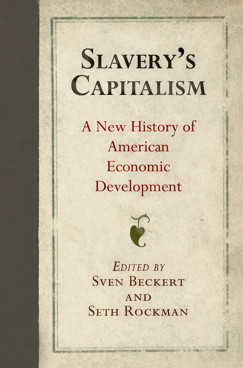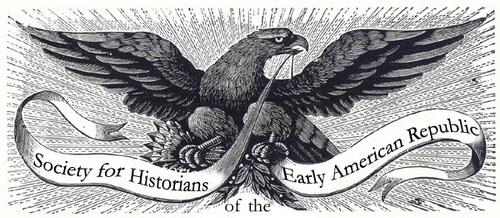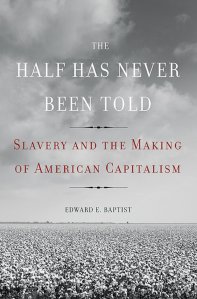 Following up yesterday’s review by Lindsay Keiter, today The Junto interviews James Parisot, author of How America Became Capitalist: Imperial Expansion and the Conquest of the West (Pluto, 2019). James teaches in the Department of Sociology at Drexel University, and received his PhD at SUNY Binghamton, home of the Fernand Braudel Center for the Study of Economies, Historical Systems, and Civilizations. Continue reading
Following up yesterday’s review by Lindsay Keiter, today The Junto interviews James Parisot, author of How America Became Capitalist: Imperial Expansion and the Conquest of the West (Pluto, 2019). James teaches in the Department of Sociology at Drexel University, and received his PhD at SUNY Binghamton, home of the Fernand Braudel Center for the Study of Economies, Historical Systems, and Civilizations. Continue reading
Tag Archives: capitalism
Guest Post: Questions About the Illicit Slave Trade, State Auctions, and Urban Infrastructure [Cross-Posted]
Todd Burst is an independent scholar who is researching and blogging about the eighteenth century British-African slave trade and the development of capitalism. He is currently writing about how Fante Africans on the Gold Coast vicariously influenced the role of the British state in commerce through the Company of Merchants Trading to Africa. He also runs the Roads to Modernity blog, where he reviews current writings about the history of slavery and capitalism, and occasionally publishes some of his own works. This guest post is cross-posted from his blog.
 In Antebellum America, Southern municipalities generated revenue by confiscating and reselling illicit slaves through public auctions.[1] In 1807, Congress prohibited the international slave trade, a year later, Louisiana followed suite, but this did not stop the trade. An illicit trade from Africa across the Atlantic continued to supply the America South with slaves. Illegal slaves were forfeited to the state. The Sheriff’s department placed these slaves in prison to await resale to the public. These findings raise questions about the role of the state in the slave trade, property laws, municipal revenues, and contributions of the sale of slaves at “property auctions” to modern city infrastructures.
In Antebellum America, Southern municipalities generated revenue by confiscating and reselling illicit slaves through public auctions.[1] In 1807, Congress prohibited the international slave trade, a year later, Louisiana followed suite, but this did not stop the trade. An illicit trade from Africa across the Atlantic continued to supply the America South with slaves. Illegal slaves were forfeited to the state. The Sheriff’s department placed these slaves in prison to await resale to the public. These findings raise questions about the role of the state in the slave trade, property laws, municipal revenues, and contributions of the sale of slaves at “property auctions” to modern city infrastructures.
Slavery’s Civil War?
Closing our week-long forum on Slavery’s Capitalism, today’s post is courtesy of Kevin Waite, a Lecturer in Modern American History at Durham University in the United Kingdom. He was recently awarded his PhD at the University of Pennsylvania with a thesis entitled “The Slave South in the Far West: California, the Pacific and Proslavery Visions of Empire.”
 No one could possibly read the fourteen essays that comprise Slavery’s Capitalism and conclude that human bondage was not absolutely central to American, and indeed global, economic development during the nineteenth century. [1] But it’s one of the corollary aims of the book—to move beyond the regionalism that has characterized much of the scholarship on slavery—that seems to me a more provocative, more novel, and perhaps more fraught intervention.
No one could possibly read the fourteen essays that comprise Slavery’s Capitalism and conclude that human bondage was not absolutely central to American, and indeed global, economic development during the nineteenth century. [1] But it’s one of the corollary aims of the book—to move beyond the regionalism that has characterized much of the scholarship on slavery—that seems to me a more provocative, more novel, and perhaps more fraught intervention.
The long tentacles of slavery stretched across the globe and reached into a staggering array of institutions – educational, legal, financial, and political.This becomes especially clear by the final section of the book, “National Institutions and Natural Boundaries.” Compelling essays by Craig Steven Wilder, Andrew Shankman, Alfred L. Brophy and John Majewski provide a fitting capstone to a geographically and conceptually wide-ranging book. This is a history of slavery that catapults us far beyond the slave South. Continue reading
Slave Economies of the U.S. North
Continuing our forum on Slavery’s Capitalism, today we are pleased to feature a contribution from Christy Clark-Pujara, Assistant Professor of History in the Afro-American Studies Department at the University of Wisconsin-Madison, and the author of Dark Work: The Business of Slavery in Rhode Island (NYU Press, August 2016).
 Slavery’s Capitalism is a timely collection of essays which details the necessity of placing slavery at the center of the economic history of the United States of America. The editors convincingly contend that the nation’s economic rise is inextricably linked to the institution of slavery. Moreover, they demonstrate the necessity of understanding the rise of capitalism in the U.S. as global—the institution of slavery was essential to the rise of capitalism throughout the Western world. Part III, “Networks of Interest and the North,” examines northerners’ investments in the business of slavery—the buying and selling of goods and people that sustained plantations throughout the Americas and the financial systems that were established to facilitate those trades. Continue reading
Slavery’s Capitalism is a timely collection of essays which details the necessity of placing slavery at the center of the economic history of the United States of America. The editors convincingly contend that the nation’s economic rise is inextricably linked to the institution of slavery. Moreover, they demonstrate the necessity of understanding the rise of capitalism in the U.S. as global—the institution of slavery was essential to the rise of capitalism throughout the Western world. Part III, “Networks of Interest and the North,” examines northerners’ investments in the business of slavery—the buying and selling of goods and people that sustained plantations throughout the Americas and the financial systems that were established to facilitate those trades. Continue reading
Commodities and Agents in the History of Slavery
This contribution to the forum comes from Justin Leroy, an Assistant Professor in the Department of History at UC-Davis. Prior to joining UC Davis in 2016, he was a postdoctoral fellow in global American studies at Harvard University. He is at work on his first book, Freedom’s Limit: Racial Capitalism and the Afterlives of Slavery.
 Slavery’s Capitalism offers a tremendous amount of evidence to support what scholars of slavery have long known—that slavery underwrote nearly every aspect of American economic development for over two centuries. These essays provide unprecedented detail about the precise workings of slavery’s role in the rise of American capitalism and will inspire many future research projects. Beckert and Rockman’s introduction is an ambitious piece of historiography, drawing together a diverse array of subfields and intellectual debates. Work such as Cedric Robinson’s Black Marxism and Ian Baucom’s Specters of the Atlantic, while key texts for interdisciplinary scholars working on questions of racial capitalism, are not often acknowledged by historians of the “new history of capitalism.” The introduction’s scope makes it an excellent primer for specialists and non-specialists alike. It is the most comprehensive of the recent review essays on slavery and capitalism, yet the breadth of this introduction is not matched by the essays within. Continue reading
Slavery’s Capitalism offers a tremendous amount of evidence to support what scholars of slavery have long known—that slavery underwrote nearly every aspect of American economic development for over two centuries. These essays provide unprecedented detail about the precise workings of slavery’s role in the rise of American capitalism and will inspire many future research projects. Beckert and Rockman’s introduction is an ambitious piece of historiography, drawing together a diverse array of subfields and intellectual debates. Work such as Cedric Robinson’s Black Marxism and Ian Baucom’s Specters of the Atlantic, while key texts for interdisciplinary scholars working on questions of racial capitalism, are not often acknowledged by historians of the “new history of capitalism.” The introduction’s scope makes it an excellent primer for specialists and non-specialists alike. It is the most comprehensive of the recent review essays on slavery and capitalism, yet the breadth of this introduction is not matched by the essays within. Continue reading
Autumn Reads

Winslow Homer, “The Country School,” 1871
Looks like #VastEarlyAmerica just got even vaster—and that’s a good thing. Here’s our fall preview of new titles. Please share your books/finds in the comments! Continue reading
Women and the History of Capitalism

 One of the best questions a historian can ask is, “what am I missing?” Whatever you’re investigating, and whatever stage you’re at, it’s always worth your while to step back and look around. If you’ve been focusing on something, using a particular lens, it can be pretty hard to pan out. That’s where setting aside time for more eclectic reading really helps—journals and blogs are convenient ways to keep your field of vision broad. Sometimes, they can give you a kick. That’s how I felt about the forum on women’s history in this summer’s issue of the Journal of the Early Republic.[1] Continue reading
One of the best questions a historian can ask is, “what am I missing?” Whatever you’re investigating, and whatever stage you’re at, it’s always worth your while to step back and look around. If you’ve been focusing on something, using a particular lens, it can be pretty hard to pan out. That’s where setting aside time for more eclectic reading really helps—journals and blogs are convenient ways to keep your field of vision broad. Sometimes, they can give you a kick. That’s how I felt about the forum on women’s history in this summer’s issue of the Journal of the Early Republic.[1] Continue reading
Building Intellectual Community at SHEAR
 Students of the early American republic: I urge you to apply to SHEAR 2016’s Graduate Research Seminars!
Students of the early American republic: I urge you to apply to SHEAR 2016’s Graduate Research Seminars!
The program, which debuted last year, brings together grad students and senior faculty clustered around four “hot” themes in the field for an hour and a half or so of small-group discussion. Lunch is free. The sessions are open to current graduate students and those who earned a Ph.D. during the 2015-16 academic year. A one-page dissertation abstract is all it takes to apply. Best of all, this year’s lineup of topics and faculty is just as wonderful as 2015’s was. Continue reading
Guest Post: Correcting an Incorrect “Corrective”
Edward E. Baptist is the author of The Half Has Never Been Told: Slavery and the Making of American Capitalism. He would like to “thank Joshua Rothman, Jefferson Cowie, Louis Hyman, and David Silbey for advice on this piece of writing, and The Junto for letting me publish in their space.”
 How was an immense increase in the “efficiency” of cotton production achieved in the nineteenth century? The question cuts to the heart of the debates over the history of U.S. slavery.
How was an immense increase in the “efficiency” of cotton production achieved in the nineteenth century? The question cuts to the heart of the debates over the history of U.S. slavery.
Last week, The Junto linked to sociologist John Clegg’s review in Critical Historical Studies, which considered several recent books on slavery and capitalism. This blog reported Clegg’s take on The Half Has Never Been Told as a “corrective.” Clegg attacks my argument that intense coercion drove a 400% increase in the efficiency of cotton-picking slave labor in the U.S. South between 1800 and 1860. His critiques directly build on the work of economists Alan Olmstead and Paul Rhode. In a series of essays, they asserted that efficiency actually increased because of improved seeds. In a recent issue of the Journal of Economic History, Olmstead appears somewhat displeased that I disagree with their assertions. Continue reading
Continuing the Debate on Slavery and Capitalism
 It’s been two and a half years since the new history of capitalism marked its arrival with the full red carpet treatment in the New York Times. So it’s about time we saw some serious and constructive critiques of the project. Robin Blackburn’s lengthy review of Empire of Cotton goes some way to bringing that Bancroft-winner back down to earth, particularly by scrutinising the concept of “war capitalism.” But what I particularly want to share with Junto readers today is an article by the NYU sociologist John Clegg recently published in the Chicago-based journal, Critical Historical Studies. Continue reading
It’s been two and a half years since the new history of capitalism marked its arrival with the full red carpet treatment in the New York Times. So it’s about time we saw some serious and constructive critiques of the project. Robin Blackburn’s lengthy review of Empire of Cotton goes some way to bringing that Bancroft-winner back down to earth, particularly by scrutinising the concept of “war capitalism.” But what I particularly want to share with Junto readers today is an article by the NYU sociologist John Clegg recently published in the Chicago-based journal, Critical Historical Studies. Continue reading